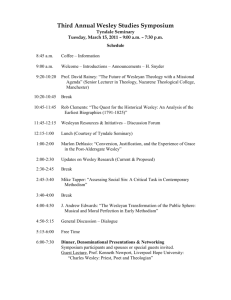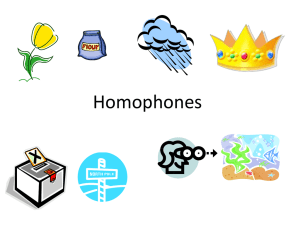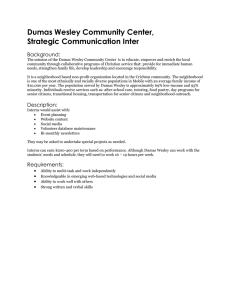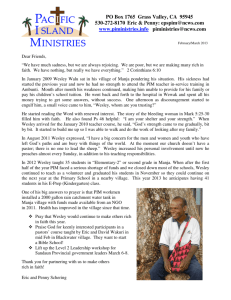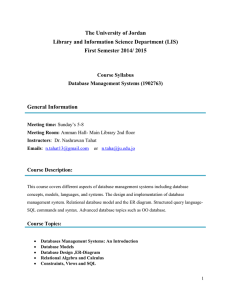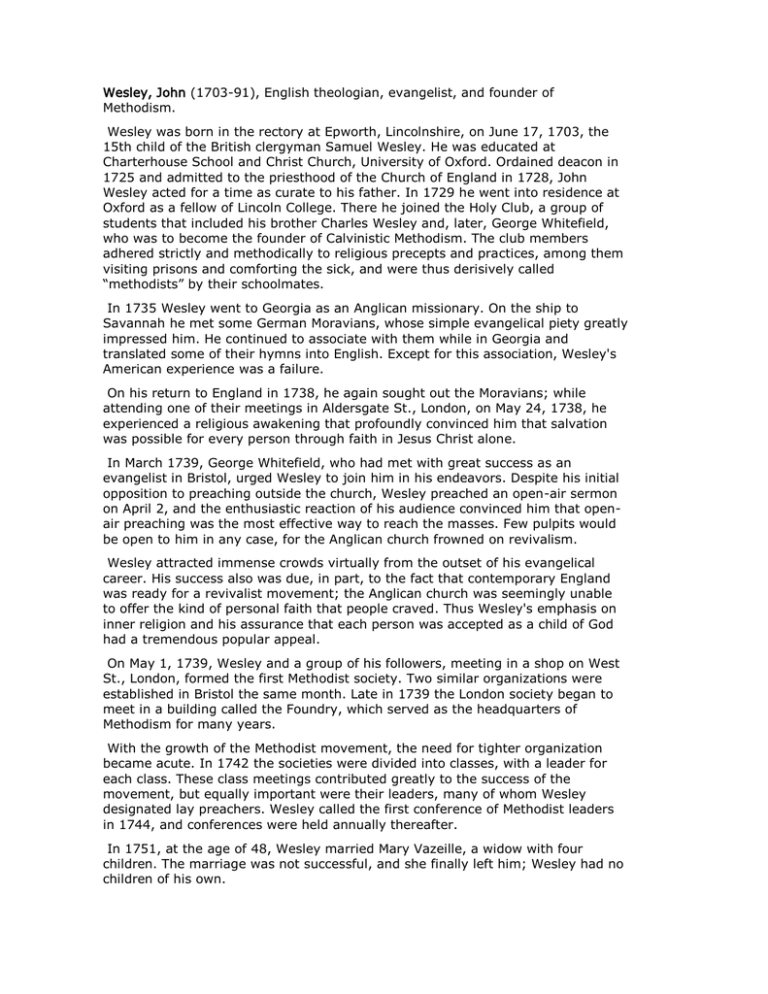
Wesley, John (1703-91), English theologian, evangelist, and founder of
Methodism.
Wesley was born in the rectory at Epworth, Lincolnshire, on June 17, 1703, the
15th child of the British clergyman Samuel Wesley. He was educated at
Charterhouse School and Christ Church, University of Oxford. Ordained deacon in
1725 and admitted to the priesthood of the Church of England in 1728, John
Wesley acted for a time as curate to his father. In 1729 he went into residence at
Oxford as a fellow of Lincoln College. There he joined the Holy Club, a group of
students that included his brother Charles Wesley and, later, George Whitefield,
who was to become the founder of Calvinistic Methodism. The club members
adhered strictly and methodically to religious precepts and practices, among them
visiting prisons and comforting the sick, and were thus derisively called
“methodists” by their schoolmates.
In 1735 Wesley went to Georgia as an Anglican missionary. On the ship to
Savannah he met some German Moravians, whose simple evangelical piety greatly
impressed him. He continued to associate with them while in Georgia and
translated some of their hymns into English. Except for this association, Wesley's
American experience was a failure.
On his return to England in 1738, he again sought out the Moravians; while
attending one of their meetings in Aldersgate St., London, on May 24, 1738, he
experienced a religious awakening that profoundly convinced him that salvation
was possible for every person through faith in Jesus Christ alone.
In March 1739, George Whitefield, who had met with great success as an
evangelist in Bristol, urged Wesley to join him in his endeavors. Despite his initial
opposition to preaching outside the church, Wesley preached an open-air sermon
on April 2, and the enthusiastic reaction of his audience convinced him that openair preaching was the most effective way to reach the masses. Few pulpits would
be open to him in any case, for the Anglican church frowned on revivalism.
Wesley attracted immense crowds virtually from the outset of his evangelical
career. His success also was due, in part, to the fact that contemporary England
was ready for a revivalist movement; the Anglican church was seemingly unable
to offer the kind of personal faith that people craved. Thus Wesley's emphasis on
inner religion and his assurance that each person was accepted as a child of God
had a tremendous popular appeal.
On May 1, 1739, Wesley and a group of his followers, meeting in a shop on West
St., London, formed the first Methodist society. Two similar organizations were
established in Bristol the same month. Late in 1739 the London society began to
meet in a building called the Foundry, which served as the headquarters of
Methodism for many years.
With the growth of the Methodist movement, the need for tighter organization
became acute. In 1742 the societies were divided into classes, with a leader for
each class. These class meetings contributed greatly to the success of the
movement, but equally important were their leaders, many of whom Wesley
designated lay preachers. Wesley called the first conference of Methodist leaders
in 1744, and conferences were held annually thereafter.
In 1751, at the age of 48, Wesley married Mary Vazeille, a widow with four
children. The marriage was not successful, and she finally left him; Wesley had no
children of his own.
An indefatigable preacher and organizer, Wesley traveled about 8000 km (5000
mi) a year, delivering as many as four or five sermons a day and founding new
societies.
Wesley parted with the Moravians in 1740 because of doctrinal disagreements,
and he rejected the Calvinist doctrine of predestination, thus breaking with
Whitefield. He also discarded many tenets of the Church of England, including the
doctrine of the apostolic succession (the maintenance of an unbroken line of
succession of bishops of the Christian church beginning with St. Peter), but he
never voiced any intention of establishing the movement as a new church. His
actions made separation inevitable, however. In 1784 he issued the deed of
declaration, which provided rules and regulations for the guidance of the Methodist
societies. The same year he appointed his aide Thomas Coke, an Anglican
clergyman, a superintendent of the Methodist organization in the U.S.,
empowering him to administer the sacraments; other ordinations followed.
Ordination represented the biggest step in the direction of a break with the
Anglican church. Separation did not take place, however, until after Wesley's
death.
Wesley was deeply concerned with the intellectual, economic, and physical wellbeing of the masses. He was also a prolific writer on a wide variety of historical
and religious subjects. His books were sold cheaply, so that even the poor could
afford to buy them; thus he did much to improve the reading habits of the general
public. He aided debtors and those trying to establish businesses and founded
medical dispensaries. He opposed slavery and was interested in social reform
movements of all kinds.
Wesley compiled 23 collections of hymns, edited a monthly magazine, translated
Greek, Latin, and Hebrew works, and edited, under the title The Christian's
Pattern, the noted medieval devotional work De Imitatione Christi, generally
ascribed to the German ecclesiastic Thomas à Kempis. His personal Journal (173590) is outstanding for the frank exposition of his spiritual development.
In the latter years of his life the hostility of the Anglican church to Methodism had
virtually disappeared, and Wesley was greatly admired. He died March 2, 1791,
and was buried in the graveyard of City Road Chapel, London. In Westminster
Abbey is a memorial plaque inscribed with his name. 1
1"Wesley, John."Microsoft® Encarta® Encyclopedia 2001. © 1993-2000 Microsoft Corporation.
All rights reserved.


